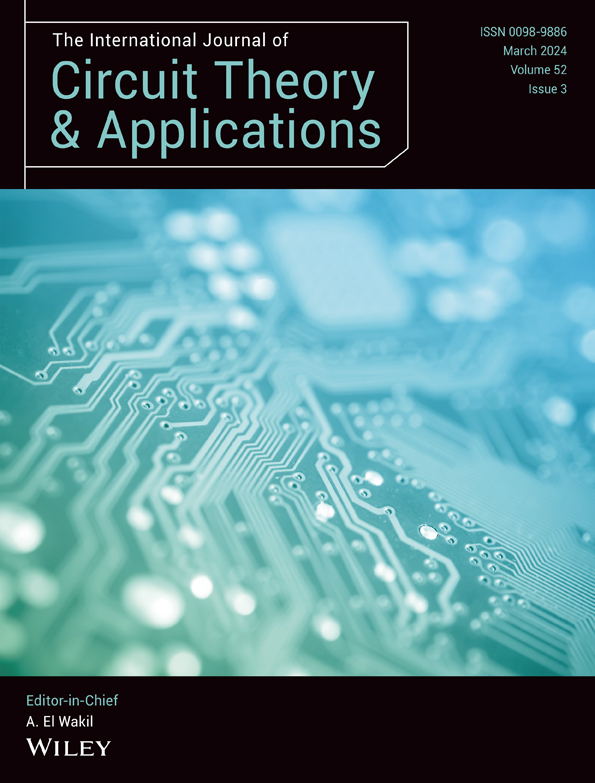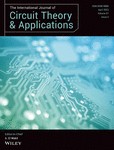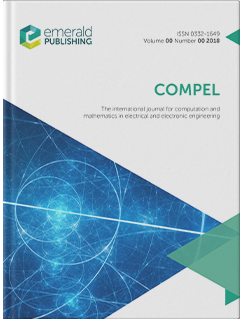
On the fractional domain analysis of negative group delay circuits (2024)
Title : On the fractional domain analysis of negative group delay circuits
Researcher : Banchuin, R.
Department : Faculty of Engineering, Siam University, Bangkok, Thailand
Email : rawid.ban@siam.edu
Abstract : In this work, the analysis of negative group delay circuits in fractional domain has been conducted. The low pass and the high pass negative group delay circuits constructed based on passive network have been chosen as our candidate circuits. For performing the analysis in fractional domain, the novel Caputo–Fabrizio derivative-based fractional impedance have been introduced to both circuits. The crucial parameters, the necessary conditions, and the existence conditions of both candidate negative group delay circuits have been formulated. The simulations have been conducted based on the formulated results where the comparisons with the conventional prototypes have been made. The verifications by the proof-of-concept circuits have also been performed. In addition, the effects of variation in the order of fractional impedances have been investigated. In summary, it has been found that considering these negative group delay circuits in the fractional domain, which effectively taking unavoidable nonidealities that cannot be modeled in conventional domain into account, significantly alters their characteristics especially the low pass circuit. However they can retain their low pass and high pass negative group delay functions.
Link to article : International Journal of Circuit Theory and Applications, 2024, 52(3), pp. 1531–1546 https://doi.org/10.1002/cta.3819
Journal : International Journal of Circuit Theory and Applications / in Scopus
Bibliography : Banchuin, R. (2024). On the fractional domain analysis of negative group delay circuitsd. International Journal of Circuit Theory and Applications, 52(3), 1531–1546 https://doi.org/10.1002/cta.3819

On the noise performances of fractal-fractional electrical circuits (2023)
Title : On the noise performances of fractal-fractional electrical circuits
Researcher : Banchuin, R.
Department : Faculty of Engineering & Graduated School of IT, Siam University, Bangkok, Thailand
Email : rawid.ban@siam.edu
Abstract : In this work, the noise performances of the fractal-fractional electrical circuits have been addressed. The nonlocal fractal calculus has been adopted as our mathematical basis. The fractal time component has also been included for the physical measurability of electrical quantities. The derivations of crucial stochastic parameters of circuit responses, which determine their noise performances, have been performed. Numerical simulations have also been conducted where the influences of Hausdorff dimension of the fractal set, orders of fractal-fractional reactive components, and other parameters on the noise performances have been studied. Regardless to any specific circuit, we have found that the noise performances can be improved by increasing the orders of fractal-fractional reactive components. The optimum Hausdorff dimensions, which the best noise performances can be achieved given the orders of fractal-fractional reactive components, have also been calculated. The results proposed in this work serve as the foundation for understanding noise in fractal-fractional electrical circuits and can be extensively applied to large-scaled circuits, for example, the infinite circuit networks and so forth.
Link to article : International Journal of Circuit Theory and Applications, 2023, 51(1), pp. 80–96. https://doi.org/10.1002/cta.3407
Journal : International Journal of Circuit Theory and Applications / in Scopus
Bibliography : Banchuin, R. (2023). On the noise performances of fractal-fractional electrical circuits. International Journal of Circuit Theory and Applications, 51(1), 80–96. https://doi.org/10.1002/cta.3407
ฐานข้อมูลงานวิจัย มหาวิทยาลัยสยาม : https://e-research.siam.edu/kb/on-the-noise-performances/

On the test of novel constitutive relation of capacitor for electrical circuit analysis: a fractal calculus-based approach (2023)
Title : On the test of novel constitutive relation of capacitor for electrical circuit analysis: a fractal calculus-based approach
Researcher : Banchuin, R.
Department : Faculty of Engineering, & Graduated School of IT, Siam University, Bangkok, Thailand
Email : rawid.ban@siam.edu
Abstract :
Purpose
Design/methodology/approach
Findings
Originality/value
Link to article : COMPEL – The International Journal for Computation and Mathematics in Electrical and Electronic Engineering, 2023, 42(2), pp. 506–525. https://doi.org/10.1108/COMPEL-04-2022-0143
Journal : COMPEL – The International Journal for Computation and Mathematics in Electrical and Electronic Engineering / in Scopus
Citation : Banchuin, R. (2023). On the test of novel constitutive relation of capacitor for electrical circuit analysis: a fractal calculus-based approach. COMPEL – The International Journal for Computation and Mathematics in Electrical and Electronic Engineering, 42(2), 506–525. https://doi.org/10.1108/COMPEL-04-2022-0143

The Fractional Order Generalization of HP Memristor Based Chaotic Circuit with Dimensional Consistency (2021)
Title : The Fractional Order Generalization of HP Memristor Based Chaotic Circuit with Dimensional Consistency
Researcher : Banchuin, R.
Department : Faculty of Engineering, & Graduated School of IT, Siam University, Bangkok, Thailand
Email : rawid.ban@siam.edu
Abstract : For studying the practical memristor-based chaotic circuit with fractional-order dynamic and asserting the importance of dimensional consistency awareness, the dimensional consistency aware fractional-order generalization of a Hewlett Packard (HP) memristor-based chaotic circuit with the physical meaning of fractional time component assigned has been proposed in this work. The simplest chaotic circuit based on such practical memristor has been chosen as the candidate circuit. A novel window function dedicated to HP memristor with fractional-order dynamic i.e. fractional-order HP memristor has been adopted for modelling the boundary effect. For the dynamical analysis, the revisited version of Jumarie’s modified Riemann–Liouville fractional derivative and nonlinear transformation has been used. The generalized circuit which has been found to be the simplest fractional-order HP memristor-based chaotic circuit displays a chaotic behavior with significant differences from those of its conventional integer-order prototype and its dimensional consistency ignored counterpart; thus, the importance of dimensional consistency awareness is asserted. The realization of the generalized circuit by using the fractional-order elements is indicated. The circuit emulator has also been presented.
Link to article : Cogent Engineering, 2021, 8(1), 1891731. https://doi.org/10.1080/23311916.2021.1891731
Journal : Cogent Engineering / in Scopus
Citation : Banchuin, R. (2021). The Fractional Order Generalization of HP Memristor Based Chaotic Circuit with Dimensional Consistency. Cogent Engineering, 8(1), 1891731. https://doi.org/10.1080/23311916.2021.1891731
ฐานข้อมูลงานวิจัย มหาวิทยาลัยสยาม :-

The generalized nonlocal fractal calculus: an efficient tool for fractal circuit analysis (2023)
Title : The generalized nonlocal fractal calculus: an efficient tool for fractal circuit analysis
Researcher : Banchuin, R.
Department : Faculty of Engineering, Siam University, Bangkok, Thailand
Email : rawid.ban@siam.edu
Abstract :
Purpose
Design/methodology/approach
Findings
Originality/value
Link to article : COMPEL – The International Journal for Computation and Mathematics in Electrical and Electronic Engineering, 2023, 42(6), pp. 1744–1770. https://doi.org/10.1108/COMPEL-03-2023-0085
Journal : COMPEL – The International Journal for Computation and Mathematics in Electrical and Electronic Engineering / in Scopus
Citation : Banchuin, R. (2023). The generalized nonlocal fractal calculus: an efficient tool for fractal circuit analysis. COMPEL – The International Journal for Computation and Mathematics in Electrical and Electronic Engineering, 42(6), pp. 1744–1770. https://doi.org/10.1108/COMPEL-03-2023-0085